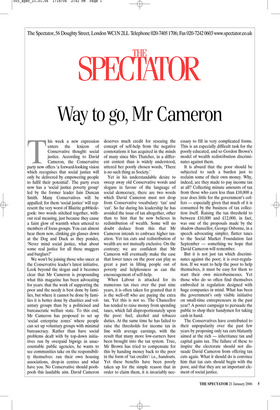Way to go, Mr Cameron
This week a new expression enters the lexicon of Conservative thought: social justice. According to David Cameron, the Conservative party now offers ‘a forward-looking vision which recognises that social justice will only be delivered by empowering people to fulfil their potential’. The party even now has a ‘social justice poverty group’ led by the former leader Iain Duncan Smith. Many Conservatives will be appalled; for them ‘social justice’ will represent the very worst of Blairite gobbledegook: two words stitched together, without real meaning, just because they cause a faint glow of warmth when uttered to members of focus groups. You can almost hear them now, clinking gin glasses down at the Dog and Duck as they ponder, ‘Never mind social justice, what about some real justice for all these muggers and burglars?’ We won’t be joining those who sneer at the Conservative leader’s latest initiative. Look beyond the slogan and it becomes clear that Mr Cameron is propounding what this magazine has been advocating for years: that the work of supporting the poor and the needy is best done by families, but where it cannot be done by families it is better done by charities and voluntary groups than by a politicised and bureaucratic welfare state. To this end, Mr Cameron has proposed to set up ‘social enterprise zones’ where people can set up voluntary groups with minimal bureaucracy. Rather than have social problems dealt with by top-down initiatives run by overpaid bigwigs in unaccountable public agencies, he wants to see communities take on the responsibility themselves: run their own housing associations, drop-in centres and what have you. No Conservative should poohpooh this laudable aim. David Cameron deserves much credit for rescuing the concept of self-help from the negative connotations it has acquired in the minds of many since Mrs Thatcher, in a different context than is widely understood, uttered her poorly chosen words, ‘There is no such thing as Society.’ Yet in his understandable desire to sweep away old Conservative words and slogans in favour of the language of social democracy, there are two words which David Cameron must not drop from Conservative vocabulary: ‘tax’ and ‘cut’. So far during his leadership he has avoided the issue of tax altogether, other than to hint that he now believes in redistribution of wealth. Some will no doubt deduce from this that Mr Cameron intends to embrace higher taxation. Yet tax cuts and redistribution of wealth are not mutually exclusive. On the contrary; we are confident that Mr Cameron will eventually make the case that lower taxes on the poor can play as great a part in lifting people out of poverty and helplessness as can the encouragement of self-help.
When Labour is attacked for its numerous tax rises over the past nine years, it is often taken for granted that it is the well-off who are paying the extra tax. Yet this is not so. The Chancellor has tended to raise money from spending taxes, which fall disproportionately upon the poor: fuel, alcohol and tobacco duties. At the same time he has failed to raise the thresholds for income tax in line with average earnings, with the result that many more low-earners have been brought into the tax system. True, Mr Brown has tried to compensate for this by handing money back to the poor in the form of ‘tax credits’: i.e., handouts. Yet these benefits have been poorly taken up for the simple reason that in order to claim them, it is invariably nec essary to fill in very complicated forms. This is an especially difficult task for the poorly educated, and so Gordon Brown’s model of wealth redistribution discriminates against them.
It is absurd that the poor should be subjected to such a burden just to reclaim some of their own money. Why, indeed, are they made to pay income tax at all? Collecting minute amounts of tax from those who earn less than £10,000 a year does little for the government’s coffers — especially given that much of it is consumed by the business of tax collection itself. Raising the tax threshold to between £10,000 and £12,000, in fact, was one of the proposals made by the shadow chancellor, George Osborne, in a speech advocating simpler, flatter taxes to the Social Market Foundation last September — something we hope that David Cameron will remember.
But it is not just tax which discriminates against the poor; it is over-regulation. If we want to help the poor to help themselves, it must be easy for them to start their own microbusinesses. Yet those who do so often find themselves embroiled in regulation designed with huge companies in mind. What has been the government’s only visible initiative on small-time entrepreneurs in the past year? A poster campaign to persuade the public to shop their handymen for taking cash in hand.
The Conservatives have contributed to their unpopularity over the past few years by proposing only tax cuts blatantly aimed at the rich — inheritance tax and capital gains tax. The failure of these to inspire the electorate should not dissuade David Cameron from offering tax cuts again. What it should do is convince him that tax cuts should begin with the poor, and that they are an important element of social justice.



















































 Previous page
Previous page